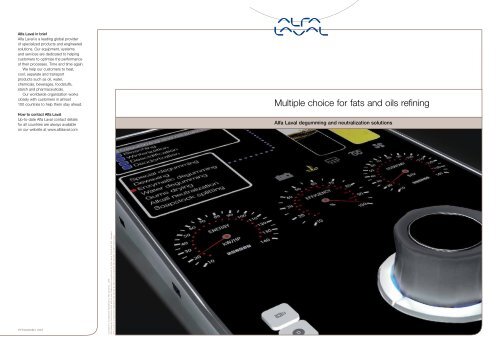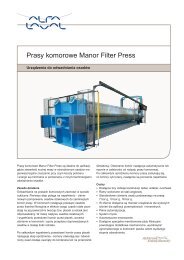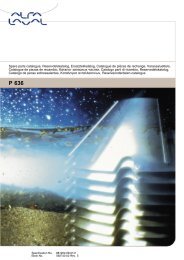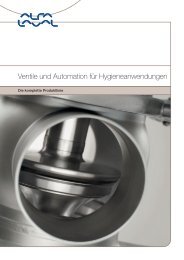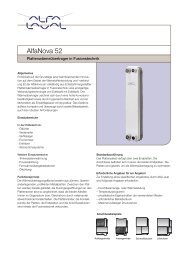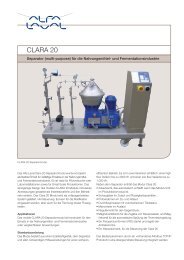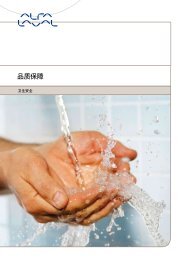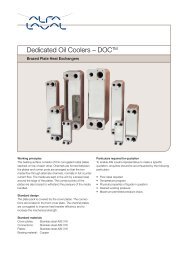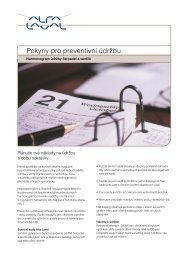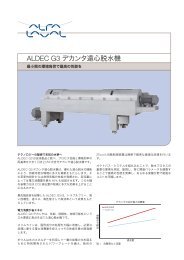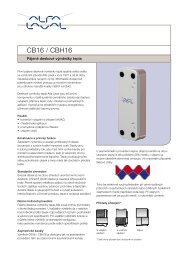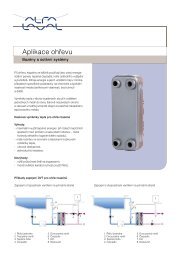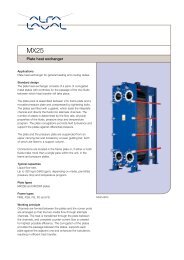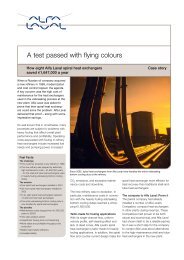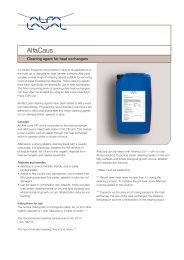Degumming and neutralization solutions - Alfa Laval
Degumming and neutralization solutions - Alfa Laval
Degumming and neutralization solutions - Alfa Laval
- No tags were found...
You also want an ePaper? Increase the reach of your titles
YUMPU automatically turns print PDFs into web optimized ePapers that Google loves.
<strong>Degumming</strong> – every which wayBoosting the value of by-productsRemoval is necessaryAll fats <strong>and</strong> oils contain gums, orgum-like material. These consist largelyof different carbohydrates, proteins<strong>and</strong> nitrogen compounds, <strong>and</strong> canbe divided into hydratable <strong>and</strong>non-hydratable gums.Water degummingGums dryingConvapConvapIf these are not removed beforethe fat or oil is exposed to the hightemperatures used in deodorization ordeacidification/deodorization, qualityproblems can well emerge. This isbecause the gum can give rise toproblematic emulsions that in turnresult in a significant waste of oil thatcould otherwise provide revenue.Water, chemicals or enzymesThese gums can be removed usingeither water degumming, otherspecialist degumming <strong>and</strong> specialdegumming processes.Hydratable gums can be removedusing water, because they absorbwater <strong>and</strong> then become insolublein oil. They are then removed usingcentrifugation.Non-hydratable gums, on the otherh<strong>and</strong>, are normally removed usinga form of acid hydrolysis or causticsoda <strong>neutralization</strong> – phosphoricacid is the most common becauseit is the most cost-effective. Addingsuch acids also helps remove anytrace metals by making them forminsoluble complexes.Alternatively, both hydratable <strong>and</strong>non-hydratable gums can be removedusing enzymes. The enzyme thatreacts specifically with phospholipidsin oil is called phospholipase.Water degummingAll seed oils contain hydratablegums, but oil derived from soybeanscontains most.Because soybean oil has a highcontent of hydratable gums, this iswhere water degumming is mostcommonly used. The gums removedwith this process are normally driedto form lecithin, which is a valuableby-product. If preferred, the gumscan instead be returned to the mealin the extraction plant.Water degumming has an importantadditional advantage that also makes itattractive in many other contexts. Usingthis relatively simple, cheap processto remove as much gum as possiblein the initial stages, less materialneeds to be removed later on using<strong>neutralization</strong>. This also means thereis less soapstock for treatmentor disposal.The <strong>Alfa</strong> <strong>Laval</strong> advantageUsing <strong>Alfa</strong> <strong>Laval</strong> equipment <strong>and</strong>technologies enables you to:• ensure a lower gum content• reduce losses of neutral oil• increase oil yield• cut down on operating costs.Lecithin – valuable by-productWhen gums are removed from edibleoils (such as soybean, rapeseedor sunflower seed oil) during thedegumming stage, they are in theform of wet gums with a moisturecontent of 40–50%.When dried, these gums becomeliquid lecithin, which can provide animportant source of additional revenue.Drying the gumsThese wet gums are homogenized <strong>and</strong>then fed to Convap evaporator units.Here the moisture is evaporated usingsteam injected into the Convap jacket.The lecithin is then separated fromthe vapours in a large cyclone,under vacuum, before being sentto Contherm heat exchanger(s) forcooling with water.Quality benefitsThe Convap evaporator <strong>and</strong> theContherm cooler are both scrapedsurfaceheat exchangers that arespecially designed for concentrating<strong>and</strong> cooling viscous, heat-sensitiveproducts such as lecithin.As the lecithin only remains within theConvap evaporator for a very shorttime, it undergoes a very brief periodof heat treatment, thus helpingmaintain product quality.In contrast to thin-film evaporators, theheat transfer surface of a Convap unitis scraped thoroughly to prevent theproduct sticking <strong>and</strong> causing burn-on.The unique construction of these<strong>Alfa</strong> <strong>Laval</strong> scraped-surface exchangersmakes sure the product is uniformlydistributed within the evaporator <strong>and</strong>the cooler, resulting in a product yieldof consistently high quality.Flexible operationTo reach the desired capacity, Convap<strong>and</strong> Contherm units are often installedwith 2 or 4 units in parallel.Any reductions in throughput, whethertemporary or not, mean the extra unitscan be turned off, thereby reducingoperating costs while maintainingstable product quality.The <strong>Alfa</strong> <strong>Laval</strong> advantageUsing <strong>Alfa</strong> <strong>Laval</strong> equipment <strong>and</strong>technologies enables you to:• ensure uniform heat distribution• reduce thermal impact onoil products• increase operating flexibility• make operation <strong>and</strong>maintenance easier.8 <strong>Alfa</strong> <strong>Laval</strong> degumming <strong>and</strong> <strong>neutralization</strong> <strong>solutions</strong> <strong>Alfa</strong> <strong>Laval</strong> degumming <strong>and</strong> <strong>neutralization</strong> <strong>solutions</strong> 9
Enzymatic treatmentsConversion yields greater benefitsVerenium’s Purifine PLC enzyme is the only commercialized PLC enzyme availabletoday. “Verenium is pleased to be working with <strong>Alfa</strong> <strong>Laval</strong>,” said Janet Roemer,Executive Vice President. “Implementing Purifine enzymatic degumming via <strong>Alfa</strong> <strong>Laval</strong>gives companies the security of dependable performance guarantees along withproven technology <strong>and</strong> know-how focused on edible oils <strong>and</strong> biofuels.”Molinos Río de la Plata, Argentina’s leading soybean <strong>and</strong> sunflower seed processor,selected <strong>Alfa</strong> <strong>Laval</strong> to convert its San Lorenzo facility to the Purifine PLC degummingprocess. “Due to this innovative step, we’ve seen a significant increase in oil yields<strong>and</strong> processing margins, enabling our facility to exploit its potential even better,” saidLuis Palacios, Molinos’ Industrial Manager.Enzymatic water degummingEnzymatic deep degummingEnzymatic deep degummingMX mixerEconomizerHeaterCoolerHigh shear mixerReactorHeaterDisc stackcentrifugeMX mixerDisc stackcentrifugeTo drying/storageor further refiningWastewaterCrude oil/waterdegummedoilSteamWaterSteamGumsAcidLyeEnzymeWaterBiological catalystsAny gums present in the oil can alsobe removed by using enzymes.Enzymes are biological catalysts thatreact specifically with target substrates,with the added advantage that theyyield few by-products.Phospholipase is the enzymethat reacts specifically with thephospholipids in oil. It converts gumsinto distinct fractions that are solublein oil <strong>and</strong> water, respectively. Thephospholipases most commonly usedin oil degumming are phospholipaseA (PLA) <strong>and</strong> phospholipase C (PLC).Enzymatic water degummingPhospholipids are emulsifiers thatcause losses of oil during thetraditional water degumming process.Phosphatidylcholine (PC) is the mosthydratable phospholipid <strong>and</strong> has thehighest emulsification strength.The PLC enzyme reacts with PC <strong>and</strong>phosphatidylethanolamine (PE), formingdiacylglycerols <strong>and</strong> a water-solublephosphate-bearing ester fragment,thus reducing the final emulsion. Thisresults in cleaner separation duringcentrifugation, <strong>and</strong> also reduceslosses of the neutral oil. In addition,the diacylglycerols produced byPLC degumming provide a bonus oilyield that is retained throughout therefining process.Since PE is a non-hydratable gum, theoil usually has a lower gum contentafter PLC degumming compared withthe water degumming process. Thismeans less material that requiresremoval in subsequent processes.Keeping options open<strong>Alfa</strong> <strong>Laval</strong> provides an optimizeddegumming solution that focuses onincreasing the oil yield <strong>and</strong> reducingutilities consumption.The <strong>Alfa</strong> <strong>Laval</strong> enzymatic waterdegumming process has the addedadvantage that it can always beswitched back to the traditional waterdegumming process if changingmarket conditions make lecithinproduction a more commerciallyattractive option.Enzymatic deep degummingEnzymatic deep degumming hasalso been developed for the physicalrefining of seed oils. To remove thegums to a level low enough to allowfurther processing, the crude oil hasto be pre-treated with a small amountof acid. The pH is then adjusted withdiluted lye before an appropriateenzyme is added.For deep degumming of highphosphoruscrude oils, a PLC enzymeis used. PC <strong>and</strong> PE are convertedinto diacylyglycerols <strong>and</strong> water solublephosphate esters, which are separatedfrom the oil during centrifugation, alongwith un-reacted gums.If a PLA enzyme is used, the enzymeconverts both hydratable <strong>and</strong> nonhydratablegums into lyso-gums <strong>and</strong>free fatty acids. The lyso-gums aremore hydrophilic, which makes themeasier to remove from the oil duringcentrifugation.<strong>Alfa</strong> <strong>Laval</strong> provides enzymatic deepdegumming <strong>solutions</strong> that employeither PLC or PLA enzymes,depending on the oil treated.Versatile processDepending on the oil type <strong>and</strong> oilquality, enzymatic deep degummingis not always the most effectiveprocessing option.That is why the <strong>Alfa</strong> <strong>Laval</strong> enzymaticdeep degumming process provides theversatility that enables you to carry out:• enzymatic deep degumming• special degumming• <strong>neutralization</strong>using the same equipment.The process is well suited for refiningedible oil as well as pre-treating otheroils as part of biodiesel production.The <strong>Alfa</strong> <strong>Laval</strong> advantageUsing <strong>Alfa</strong> <strong>Laval</strong> equipment <strong>and</strong>technologies enables you to:• produce degummed oilof better quality• reduce losses of neutral oil• increase oil yield• cut down on operating costs.10 <strong>Alfa</strong> <strong>Laval</strong> degumming <strong>and</strong> <strong>neutralization</strong> <strong>solutions</strong> <strong>Alfa</strong> <strong>Laval</strong> degumming <strong>and</strong> <strong>neutralization</strong> <strong>solutions</strong> 11
Not just a supplierOdessa Maslozhircombinat (fats <strong>and</strong> oils plant in Odessa) is one of the leadingproducers of margarine, mayonnaise <strong>and</strong> bottled sunflower oil in Ukraine, withoperations that include a sunflower oil refinery.Processes to suit all your needsWhen the company ran into quality problems with its existing degumming process, itturned to <strong>Alfa</strong> <strong>Laval</strong> for assistance. The outcome was the installation of an <strong>Alfa</strong> <strong>Laval</strong>special degumming process line that helped the plant produce oil of a better quality,while also enabling it to reduce losses.“<strong>Alfa</strong> <strong>Laval</strong> is not only a supplier to us but also a partner, guide <strong>and</strong> friend,” saysValeriy Fedorenkov, technical director.Combi MixLong MixSpecial degummingSpecial degumming has beendeveloped for the physical refining ofseed oils. By adding a small amountof a suitable acid <strong>and</strong> diluted lye, atcarefully controlled temperatures, youcan separate both hydratable <strong>and</strong> nonhydratablegums from selected oils,right down to a level where these oilshave a quality that is acceptable forfurther processing.The gums that are removed at thisstage are very sticky. This makes<strong>Alfa</strong> <strong>Laval</strong> self-cleaning disc stackcentrifuges with a special Centrizoomparing disc outlet ideal for thisseparation task.The Combi Mix processIn the case of low-quality seed oils,however, special degumming is notalways possible. To maintain the qualityof the final product, you have to givethese oils the full caustic <strong>neutralization</strong>treatment.If you want to carry out specialdegumming on as much oil as possible,but also know that you may well haveto use caustic refining at a later stageanyway, the <strong>Alfa</strong> <strong>Laval</strong> Combi Mixprocess system is the ideal solution.This two-stage process provides theflexibility you need to process goodqualityseed oils that require physicalrefining as well as any lower-qualityoils for which <strong>neutralization</strong> usingcaustic soda is the only viable wayto remove impurities.Everything you need<strong>Alfa</strong> <strong>Laval</strong> can provide all theprocessing equipment you needto remove hydratable gums withwater degumming, side by side withremoving both non-hydratable <strong>and</strong>hydratable gums from seed oils usingspecial degumming.The <strong>Alfa</strong> <strong>Laval</strong> Combi Mix processsystem also provides opportunitiesfor flexible switching back <strong>and</strong> forthbetween special degumming <strong>and</strong><strong>neutralization</strong> operations, dependingon the type <strong>and</strong> quality of the oil.The <strong>Alfa</strong> <strong>Laval</strong> advantageUsing <strong>Alfa</strong> <strong>Laval</strong> equipment <strong>and</strong>technologies enables you to:• ensure efficient mixing <strong>and</strong>separation• implement plant control systemsthat increase efficiency• pare down operating costs.Neutralization using caustic sodaThe impurities you most often haveto deal with in conjunction with fats<strong>and</strong> oils are the free fatty acids. Thesenormally stem from lower-quality rawmaterials <strong>and</strong>/or inappropriate storage.The greater the free fatty acid content,the more challenging the purificationprocess <strong>and</strong> the stronger the causticsoda concentration needed toneutralize <strong>and</strong> remove it.Neutralization using caustic soda iswidely recognized as an effectiveway to purify crude oils, <strong>and</strong> has theadvantage that the soapstock formedby this process also encapsulatesmany other impurities. These includesugars, pigments <strong>and</strong> trace metals.Neutralization of fats <strong>and</strong> oils usingcaustic soda refining is normallycarried out continuously usingdisc stack centrifuges.Once <strong>neutralization</strong> is complete, theoil is washed. The wash water is thenremoved using disc stack centrifuges,<strong>and</strong> the oil is dried in a vacuum dryer.Two different approaches<strong>Alfa</strong> <strong>Laval</strong> gives you the option of twodifferent basic ways of neutralizingfats <strong>and</strong> oils.The so-called Long Mix process isbest suited for refining crude soybeanor rapeseed oil. It features extendedcontact time in special retentionmixers. Disc stack centrifuges areused to separate the soapstock<strong>and</strong> wash water from the refined oil,in one single washing stage.The other main refining method isknown as the Multi Mix process. Thisfeatures a short contact time, whichenables you to refine virtually anyoil, using either one or two washingstages. However, if you intend toprocess cottonseed oil or crude fats<strong>and</strong> oils of low quality, a second lyetreatment – commonly known asre-refining – will be necessary.12 <strong>Alfa</strong> <strong>Laval</strong> degumming <strong>and</strong> <strong>neutralization</strong> <strong>solutions</strong> <strong>Alfa</strong> <strong>Laval</strong> degumming <strong>and</strong> <strong>neutralization</strong> <strong>solutions</strong> 13
Mixing the way you wantMarket leader in MoroccoAïcha is the leading producer of marmalade, olive oils <strong>and</strong> tomato paste in Morocco.The company operates a refinery that uses 100% <strong>Alfa</strong> <strong>Laval</strong> equipment, including aSoftColumn deodorizing plant, disc stack centrifuges <strong>and</strong> heat transfer equipment.“It’s not an exaggeration to say this is the most sophisticated edible oil refinery in thecountry,” says David Devico, managing director. “We are at least 10 years ahead ofour Moroccan competitors.”Multi MixMiscella refiningRemoving waxCertain vegetable oils, such assunflower seed oil <strong>and</strong> maize/corn oil,contain waxes. Such oils have to bedewaxed to make them commerciallyacceptable.The only way to completely remove alltraces of waxes is to use cold filtration.However, if you can remove the bulk ofthese waxes prior to such filtration, youwill be able to reap notable benefits interms of reduced product losses, fewerfilter aids used <strong>and</strong> more rapidprocessing.Combined <strong>neutralization</strong><strong>and</strong> dewaxing/winterizationThis can either be done during theinitial degumming process, or carriedout more completely in a subsequentcombined neutralizing <strong>and</strong> dewaxing/winterization process – such as the<strong>Alfa</strong> <strong>Laval</strong> Multi Wax process.This uses the high-efficiency refiningtechniques of the Multi Mix process,combined with wax crystal separation<strong>and</strong> removal techniques that <strong>Alfa</strong> <strong>Laval</strong>originally developed for fractionatingpalm oil. This combination results ina well-refined oil with hardly any waxcontent.The Multi Wax option provides youwith an efficient way to remove waxesfrom oils with a high wax content, byextending the average interval betweenwinterizing filter changes.If your cold test requirements arerelatively modest, it may then noteven be necessary to undertake coldfiltration at all.Cold refiningAn alternative to the Multi Waxprocess is cold refining, whichcombines dewaxing/winterization<strong>and</strong> <strong>neutralization</strong>. In this process,<strong>neutralization</strong> is carried out at lowtemperature, which ensures thatthe waxes are removed along withthe soapstock.The <strong>Alfa</strong> <strong>Laval</strong> advantageUsing <strong>Alfa</strong> <strong>Laval</strong> equipment <strong>and</strong>technologies enables you to:• implement plant control systemsthat increase efficiency• benefit from unique <strong>Alfa</strong> <strong>Laval</strong>Centrizoom paring disctechnology• extend the average intervalbetween winterizing filter changes• reduce production costs.Removing gossypolCrude cottonseed oil containsgossypol, which – amongst otherthings – gives the oil a dark colour <strong>and</strong>therefore has to be removed in order tomake the oil commercially acceptable.A particularly effective way of doingthis is to neutralize the oil while it is inthe midst of the extraction process.The oil <strong>and</strong> solvent mixture after thefirst evaporation, commonly calledmiscella, is reacted with causticsoda in specially designed retentionmixers. The resulting soapstock is thenremoved in a special design of discstack centrifuge.Differences in densityThe large difference between thedensities of the neutralized miscella<strong>and</strong> the soapstock results in a veryefficient separation in the disc stackcentrifuge, which means it is notusually necessary to wash the oilafterwards. The soapstock is normallyadded to the cottonseed meal inthe desolventizer/toaster while theneutralized miscella goes to finalevaporation, where the remainingsolvent is removed.Dealing with solventsThe presence of solvents in the oilmeans that the disc stack centrifugemust be purged using inert gases, <strong>and</strong>all electrical equipment must complywith the appropriate explosion-proofregulations.The <strong>Alfa</strong> <strong>Laval</strong> advantageUsing <strong>Alfa</strong> <strong>Laval</strong> equipment <strong>and</strong>technologies enables you to:• achieve exceptionally efficientmixing <strong>and</strong> separation• reduce operating costs• eliminate by-product wastes,because soapstock is addedto the meal.14 <strong>Alfa</strong> <strong>Laval</strong> degumming <strong>and</strong> <strong>neutralization</strong> <strong>solutions</strong> <strong>Alfa</strong> <strong>Laval</strong> degumming <strong>and</strong> <strong>neutralization</strong> <strong>solutions</strong> 15
Towards sustainable processesDealing with soapstockThe <strong>neutralization</strong> process results ina by-product known as soapstock,consisting of the sodium soaps of thefree fatty acids present within the oil.Soapstock always requires subsequenttreatment.The traditional method of treatingsoapstock is known as splitting. Thesoapstock is split into fatty acids <strong>and</strong>water by acidification with strongacids – usually sulphuric acid. This isoften considered an attractive solutionbecause it is relatively simple.However, such a soapstock splittingprocess takes a relatively long time,<strong>and</strong> the equipment takes up arelatively large space. Furthermore,large amounts of sulphuric acid arerequired, <strong>and</strong> disposal is a challengewithin current regulatory frameworks.Less space, less timeTo provide customers with a betteralternative, <strong>Alfa</strong> <strong>Laval</strong> has developed acontinuous processing system that ismuch faster <strong>and</strong> takes up substantiallySoapstock splittingless space. It also reduces sulphuricacid consumption by as much as50% <strong>and</strong> cuts down on effluent – withresultant environmental advantages.If you process crude oils that have ahigh gum content, <strong>Alfa</strong> <strong>Laval</strong> can alsoprovide you with a special processingsolution for the soapstocks that resultfrom this.Wastewater evaporationWithin the typical edible oil processingrefinery, water comes into directcontact with the oil in the course ofnumerous different processes.Wash water, for example, normallyresults in an effluent with a watercontent higher than 97%, with onlya small amount of organics such asneutral oil, free fatty acids, soaps <strong>and</strong>phosphatides. This provides conditionsthat are nearly ideal for recovery of thewater component via evaporation.Using steam to evaporate the watermakes it possible to concentrate thewaste product by at least a factor of10, while at the same time recoveringthe condensate – which can berecycled as process water.Two-stage wastewater evaporation2 stage wastewater evaporationSteamEjectorWastewaterEvaporatorCycloneRecovering water helps eliminateseveral routine operating costs,including those associated withadditional fresh water supplies, heatingwater to the desired temperature, <strong>and</strong>treating the effluent.EvaporatorCycloneCondenserWaterWater recyclingConcentrateEffective heat transfer<strong>Alfa</strong> <strong>Laval</strong> <strong>solutions</strong> for wastewaterevaporation are based on the use ofcompact, thermally efficient plate heatexchangers.Plate-type <strong>Alfa</strong> <strong>Laval</strong> evaporators <strong>and</strong>condensers are specially designedto h<strong>and</strong>le large vapour volume flowsunder vacuum conditions. These makeit possible to substantially reducethe physical size of the entire plant,on account of the exceptional heattransfer efficiency provided by thiscore <strong>Alfa</strong> <strong>Laval</strong> technology.The <strong>Alfa</strong> <strong>Laval</strong> advantageUsing <strong>Alfa</strong> <strong>Laval</strong> equipment <strong>and</strong>technologies enables you to:• achieve fully continuousprocessing that gives youefficient mixing• produce acid oil of better quality• reduce the effluent load fromyour factory.The <strong>Alfa</strong> <strong>Laval</strong> advantageUsing <strong>Alfa</strong> <strong>Laval</strong> equipment <strong>and</strong>technologies enables you to:• recycle water once used• reduce the effluent load• save space.16 <strong>Alfa</strong> <strong>Laval</strong> degumming <strong>and</strong> <strong>neutralization</strong> <strong>solutions</strong> <strong>Alfa</strong> <strong>Laval</strong> degumming <strong>and</strong> <strong>neutralization</strong> <strong>solutions</strong> 17
Support that makesbig differences to your bottom lineSupplying service<strong>Alfa</strong> <strong>Laval</strong> is committed to providingyou with the best possible service<strong>and</strong> help throughout the lifetime ofany product or system we supply. Weaim to help ensure that your processalways achieves peak performance,with maximum reliability <strong>and</strong> aminimum of downtime. This makesa big difference to your bottom line.The <strong>Alfa</strong> <strong>Laval</strong> Nonstop Performanceconcept is based on our worldwidenetwork of service <strong>and</strong> spare partsdistribution centres in more than fiftycountries.Prompt responseThese regional centres mean we c<strong>and</strong>eliver st<strong>and</strong>ard parts anywhere inthe world within 24–48 hours, withthe added advantage of lower freightcosts. <strong>Alfa</strong> <strong>Laval</strong> expertise makes sureany service work is carried out with theabsolute minimum of disturbance toyour operations.Full control over the entire supplychain associated with the company’sequipment means we can provideyou with prompt responses, excellentavailability <strong>and</strong> lead times that aresecond to none.The choice is yours<strong>Alfa</strong> <strong>Laval</strong> service is based onknowledge <strong>and</strong> expertise obtainedfrom years of experience workingwith customers whose focus is onprocessing edible fats <strong>and</strong> oils.This means we see each unit <strong>and</strong>component within the context of yourspecific process, <strong>and</strong> underst<strong>and</strong> therole they play within your business.That’s why we will work closely withyou to tailor a service package thatmatches your individual requirementsfor optimizing performance,streamlining costs <strong>and</strong> reducingdowntime. Whether it is on an “asneeded” basis, via a st<strong>and</strong>ardizedPerformance Agreement, or as acustomized service package, thechoice is yours.H<strong>and</strong>s-on help<strong>Alfa</strong> <strong>Laval</strong> service experts are on h<strong>and</strong>to work with you as needed, rightfrom removing old or defect units toinstalling <strong>and</strong> running in new ones.The service packages reduceunplanned downtime, extendequipment life <strong>and</strong> ensure rapidturnarounds. The aim is to relieve youof maintenance <strong>and</strong> service burdens,so you can focus on the details of yourprocesses <strong>and</strong> your business.At your disposal<strong>Alfa</strong> <strong>Laval</strong> has the worldwideresources to help you throughoutthe service life of your fats <strong>and</strong> oilsrefining set-up. In addition to helpingyou tend to complete installations, weprovide comprehensive service supportfor all individual items of equipment,including <strong>Alfa</strong> <strong>Laval</strong> heat exchangers,fluid h<strong>and</strong>ling equipment, decantercentrifuges <strong>and</strong> disc stack centrifuges.Our customer service consultantsare on call 24/7 to provide you withtechnical expertise, <strong>Alfa</strong> <strong>Laval</strong> genuinespare parts <strong>and</strong> service, operatortraining <strong>and</strong> field service – or justgeneral information.We can also provide exchangeassemblies <strong>and</strong> upgrade yourset-up as <strong>and</strong> when yourrequirements change <strong>and</strong> exp<strong>and</strong>.The know-how is there – <strong>and</strong> at yourdisposal right when you need it.18 <strong>Alfa</strong> <strong>Laval</strong> degumming <strong>and</strong> <strong>neutralization</strong> <strong>solutions</strong>


